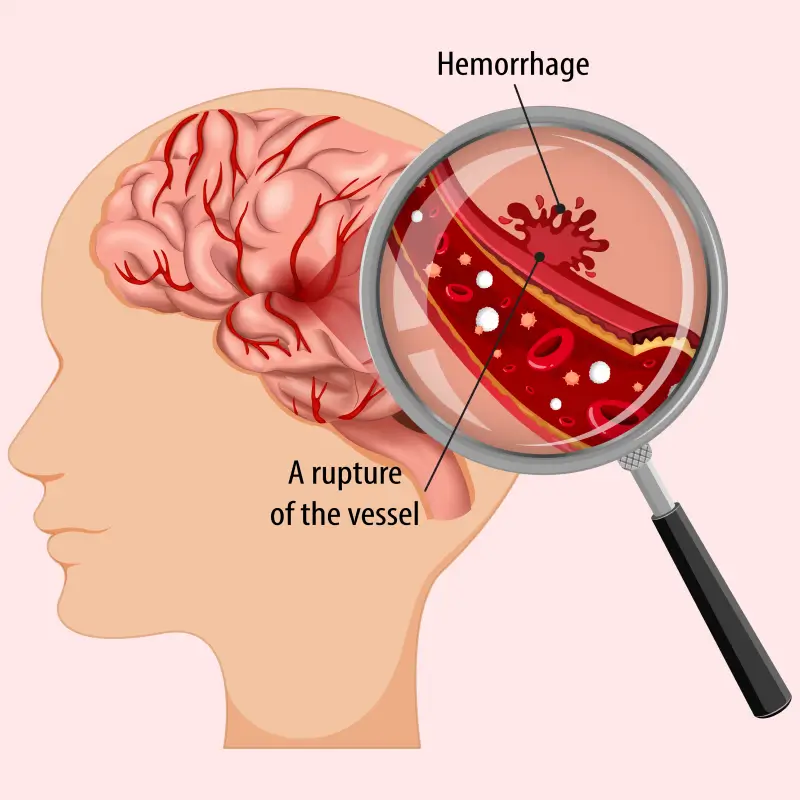
What is brain hemorrhage and how does it differ from stroke?
Brain hemorrhage is a medical emergency which occurs when A blood vessel in the brain leaks or bursts, causing bleeding within the brain. The increased pressure because of the bleed damages brain cells.
Brain hemorrhage itself is a cause of stroke in 15-20% of the cases and It causes symptoms like a stroke which commonly occurs when blood flow to part of the brain is blocked
What are the different types of brain hemorrhages and what are their causes?
Brain hemorrhages are usually described based on the region within the skull and brain where the bleed has occurred.
For example:-
- extradural hemorrhage and subdural hemorrhages Occur outside the brain and within the skull. These occur commonly due to trauma. Statistically the most common cause of brain hemorrhage is due to Head injury because of a fall or from a road traffic accident.
- Intracerebral hemorrhage: Bleeding within brain tissue itself It is commonly caused due to uncontrolled high blood pressure, weak blood vessels and arterio venous malformations which are basically abnormal growth of weak blood vessels in the brainSub arachnoid Haemorrhage: commonly caused by ruptured aneurysms which are balloon shaped weakened section of a blood vessel within the brain
What are the warning signs and symptoms of a brain hemorrhage? When should someone seek immediate medical attention?
Sudden, severe headache, with or without neck pain followed by loss of consciousness
- B: balance
- E: vision
- F: face
- A: arm weakness
- S: speech problem
- T: act fast call emergency services
How is a brain hemorrhage diagnosed? What tests are typically involved?
CT Scan, this scan helps locate the bleeding. It’s often the first choice due to its speed and accuracy
MRI brain: Provides detailed images of brain structures. Used for AVMs
CT angiogram, Digital subtraction angiogram (DSA): for AVMs and aneurysms
What are the treatment options for brain hemorrhage? Do they differ depending on the type and severity?
- Yes, treatment for brain hemorrhage differ depending on location, cause and severity of bleed. Treatment for brain hemorrhages is aimed at
- managing the cause of the hemorrhage: Bringing down the BP, Aneurysms and AVMs can be treated with surgery or through endovascular means
- Decreasing the increased pressure inside the brain because of the bleed with medicines or for large hematomas surgery can be done to remove the blood clot.
- preventing symptoms due to bleed, like seizures and
- supportive care like providing oxygen and ventilatory support
Remember, prompt medical attention can limit brain damage and improve recovery chances.
What is the recovery timeline for someone who has experienced a brain hemorrhage
Recovery time after brain hemorrhage depends on the location, size of the bleed and the initial condition of the patient at the time of admission to the hospital. Hemorrhages in the brain stem and dominant side of the brain have a longer recovery time. The greatest recovery happens between 3 to 6 months after the bleed.
What are the long-term effects of a brain hemorrhage? Are there rehabilitation options available to help with recovery?
Many patients have persistent problems after brain hemorrhage like limb weakness, speech problems, problems in cognition – problems in thinking and reasoning skills, behavioral and mood changes. So, Rehabilitation is most important for recovery from brain hemorrhage and should be started as soon as possible. Some of the components of this are speech therapy, physical therapy, cognitive therapy.
Rehabilitation helps the brain to form new connections from which relearning of skills will occur and patient can recover function.
Are there any specific risk factors for brain hemorrhage that people should be aware of?
High blood pressure, diabetes, high cholesterol, smoking, previous stroke with patient on blood thinners
What can be done to prevent a brain hemorrhage from happening in the first place?
Monitor your blood pressure
- Control your cholesterol
- Keep your blood sugar down
- Get active
- Eat better
- Don't smoke
- Lose weight if required. Get regular check-ups and stay in communication with the doctor
Are there any resources available for patients and families who have been affected by brain hemorrhage?
- INDIAN STROKE ASSOCIATION
- CEREBROVASCULAR SOCIETY OF INDIA

